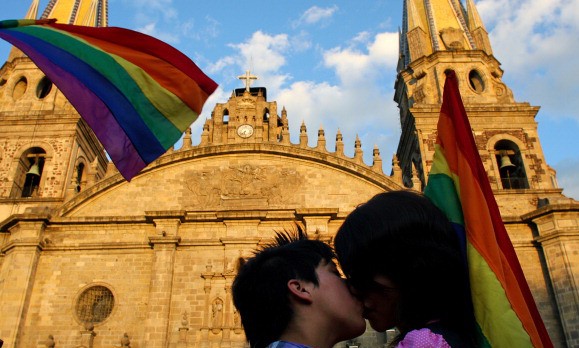This month, the Mexican Supreme Court revisited the same-sex marriage rulings it had delivered over the last five years, ultimately issuing a “jurisprudential thesis” declaring that state laws restricting access to marriage to heterosexuals discriminatory. While not explicitly invalidating state laws, the Court’s position allows same-sex couples to marry in any district in Mexico – as long as they jump through some legal hoops. District judges are obligated to follow the Supreme Court’s ruling; couples who file injunctions against state marriage laws will be able to force local clerks to issue marriage licenses.
Given the Court’s strong track record of upholding the right of gay couples to marry, this decision is unsurprising. But it is still bold. The Court’s ruling directly contradicts many state legislatures who have explicitly defined marriage as a legal construct that exists between a man and a woman. Only one of the 31 Mexican states and the federal district of Mexico City explicitly recognize same-sex marriage. In a nation where only 38% of people support same-sex marriage, the judicial branch has spoken out to protect a disenfranchised minority from the whims of the majority. In short, it has done its job.
To the north, and in a far less conservative political climate, the United States Supreme Court will soon have the chance to revisit this question when it decides Obergefell v. Hodges. The case asks if the 14th Amendment requires states to issue marriage licenses to same-sex couples and has the potential to extend the right to marry to homosexual couples across the nation. During oral arguments, justices seemed less willing than their Mexican counterparts to be at the forefront of societal change. Justice Kennedy, who (as usual) will likely be the swing vote in this case, repeatedly stressed that the heterosexual definition of marriage “has been with us for millennia… It’s very difficult for the court to say, oh, well, we know better.”
Kennedy’s hesitance to outpace the tastes of society is reflected in the broader trend of decisions related to same-sex marriage, which have advanced gay rights in incremental (or nonexistent) steps. United States v. Windsor struck down key provisions of the Defense of Marriage Act, extending federal recognition to same-sex marriages, while Hollingsworth v. Perry, the case based on California’s Proposition 8, which banned same-sex marriage, was simply thrown out on an issue of standing, deferring the issue.
Justice Kennedy’s hesitance aside, the current order will not last for millennia. His truculence – and the attitude of the more conservative justices on the Court – is becoming untenable. Shifting public opinion rips the supports out from under their arguments. Sixty percent of Americans support same-sex marriage, and 37 states have already legalized it. Instead of being the vanguard of minority protection like the Mexican Supreme Court, the U.S. Supreme Court is positioned to simply affirm the broader sea change in public opinion – if not in Obergefell, then in the next case, or the one after that. It is too late for the U.S. to have a Mexico moment. When the inevitable pro-legalization decision is handed down, it will not be greeted as a human rights triumph as it was by (admittedly liberal) commentators in Mexico. It will simply be a sign that the Court has stopped putting so much faith in the past and started living in the present.

